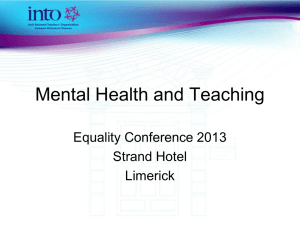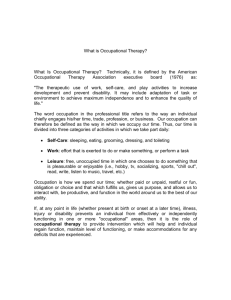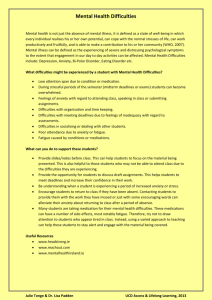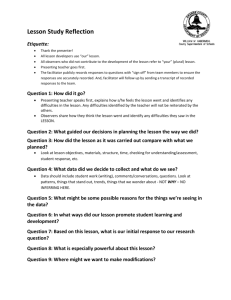Mental Health & Wellbeing Policy: - Heriot
advertisement
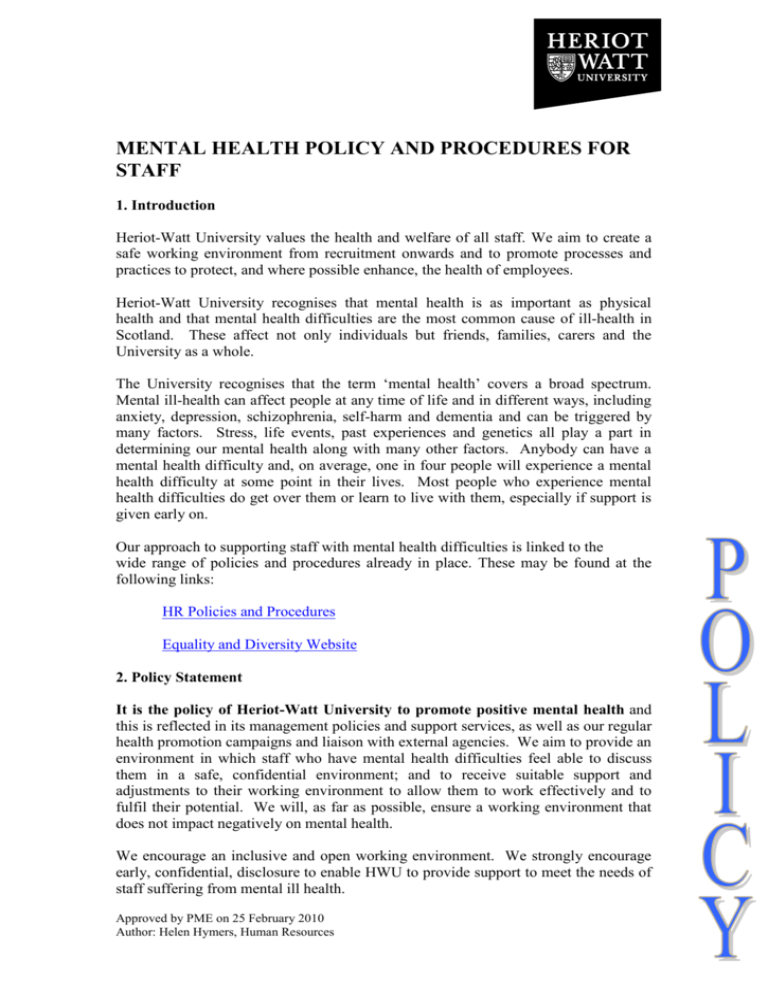
MENTAL HEALTH POLICY AND PROCEDURES FOR STAFF 1. Introduction Heriot-Watt University values the health and welfare of all staff. We aim to create a safe working environment from recruitment onwards and to promote processes and practices to protect, and where possible enhance, the health of employees. Heriot-Watt University recognises that mental health is as important as physical health and that mental health difficulties are the most common cause of ill-health in Scotland. These affect not only individuals but friends, families, carers and the University as a whole. The University recognises that the term ‘mental health’ covers a broad spectrum. Mental ill-health can affect people at any time of life and in different ways, including anxiety, depression, schizophrenia, self-harm and dementia and can be triggered by many factors. Stress, life events, past experiences and genetics all play a part in determining our mental health along with many other factors. Anybody can have a mental health difficulty and, on average, one in four people will experience a mental health difficulty at some point in their lives. Most people who experience mental health difficulties do get over them or learn to live with them, especially if support is given early on. Our approach to supporting staff with mental health difficulties is linked to the wide range of policies and procedures already in place. These may be found at the following links: HR Policies and Procedures Equality and Diversity Website 2. Policy Statement It is the policy of Heriot-Watt University to promote positive mental health and this is reflected in its management policies and support services, as well as our regular health promotion campaigns and liaison with external agencies. We aim to provide an environment in which staff who have mental health difficulties feel able to discuss them in a safe, confidential environment; and to receive suitable support and adjustments to their working environment to allow them to work effectively and to fulfil their potential. We will, as far as possible, ensure a working environment that does not impact negatively on mental health. We encourage an inclusive and open working environment. We strongly encourage early, confidential, disclosure to enable HWU to provide support to meet the needs of staff suffering from mental ill health. Approved by PME on 25 February 2010 Author: Helen Hymers, Human Resources We aim to ensure that staff are supported to respond to disclosures of mental health issues. We will achieve this through this policy, guidance, training and a clear outline of available resources within the University and signposting for external support. We are committed to creating an environment where staff feel supported to disclose any disability. Monitoring disclosure will be an effective way of demonstrating our ability to create and maintain this environment. This activity is encompassed within our wider Equality and Diversity activity as outlined in our Equality Scheme which can be found at www.hw.ac.uk/equality. More detailed information is also available in the procedures attached to this document, under Section 7 page 10. 3. Scope of the Policy This policy applies to all staff of Heriot-Watt University and aims to ensure that staff feel supported in their work. This Policy does not apply to students. The Mental Health Policy for Students can be found by clicking on: Student Mental Health - A Guide for Staff or by contacting Student Support and Accommodation directly on 0131 451 3386. 4. Purpose of the Policy The purpose of this policy is to support staff in carrying out their role effectively. It also seeks to ensure that staff who are both personally affected by or dealing with instances of mental ill-health are given appropriate help and support to do so. 5. Context of the Policy The University has a duty to respect, and respond to the rights, and support needs of staff with mental health difficulties. However, the University also has to balance those rights with the overall duty of care it has to all staff. We also have legal responsibilities under the Health and Safety at Work Act 1974, the Management of Health and Safety At Work Regulations 1999 and the Equality Rights Bill (incorporating the Disability Discrimination Act (DDA) 2003 and all subsequent amendments) as well as the Data Protection Act 1998. The Disability Discrimination Act defines a disability as “a physical or mental impairment which has a substantial and long term adverse effect on the ability to carry out normal day-to-day activities” and defines “a long term impairment” as one which lasts or is likely to last for 12 months or more. Certain mental health difficulties may fall under this definition and will therefore be considered as disabilities. The University is an authorised user of the Disability “Two Ticks” symbol, which means we are committed to employing disabled people. Further guidance is available on the University Vacancies web page, or by following this link: Disability Guide Information for Recruitment The University Sickness Absence Policy refers both to short and long term absence and sets out the procedures to be followed in either instance, including potential or actual disabilities. Approved by PME on 25 February 2010 Author: Helen Hymers, Human Resources 2 When a member of staff advises their line manager that they have a mental health difficulty this information will be forwarded to the relevant HR Adviser in order to ensure support is given. Where it is indicated that the condition lasts, or is likely to last for 12 months the condition is likely to be deemed a disability. In such cases, the University must either make reasonable adjustments where required, or reasonable redeployment, in order to ensure that the individual is able to carry out his or her job. The Procedures attached to this Policy set out the process for determining what constitutes a “reasonable adjustment”. 6. Responsibility of the University The University is responsible for: Promoting good mental health Providing centralised support through People and Organisational Development and the Occupational Health Service. Providing training to staff in issues relating to mental health Encouraging a non-stigmatising environment for all staff and students within the University Ensuring sensitivity in disclosure Maintaining confidentiality unless it is clearly inappropriate to do so (see section 8, page 4 of this policy for more detail) Monitoring the effectiveness of this policy on an ongoing basis. 7. Responsibility of All Staff All staff are expected to treat others with respect and to avoid stigmatising staff and students with mental health difficulties. Staff and students with mental health difficulties should be treated as individuals and not as a problem or condition. All staff are expected to maintain confidentiality and respect the dignity of individuals (unless the risk to the individual or others over-rides the need for confidentiality; e.g. in the case of mental health emergencies such as suicidal ideas or the risk of harm to self or others). Staff are encouraged to take advantage of training or information available to them. Staff are encouraged to recognise the limits of what they can do and to seek help and guidance. Approved by PME on 25 February 2010 Author: Helen Hymers, Human Resources 3 8. Confidentiality All dealings with individuals should be carried out in confidence and this is especially important to those who are experiencing mental health difficulties. We have an obligation to respect individuals’ privacy and the need for sensitivity and have certain responsibilities under the Data Protection Act. However, there may be circumstances in which it is necessary to breach confidence if the individual is thought to be a risk to him/herself or to other people. It may be appropriate to inform an individual that confidentiality is not guaranteed. If there is a conflict in deciding the appropriate action to take the safety of the individual and/or the safety of other members of staff or students takes priority over confidentiality. Approved by PME on 25 February 2010 Author: Helen Hymers, Human Resources 4 PROCEDURES FOR MANAGING STAFF MENTAL HEALTH ISSUES 1. Introduction The following section outlines the existing processes to support an individual who discloses a mental health problem. In the main, these processes are the same, regardless of the medical condition disclosed, although the outcome, support and reasonable adjustments (if any are made) will depend vary according to the individual’s needs. 2. Responsibilities of staff dealing with individuals with Mental Health Difficulties Managers with responsibility for Staff If you have concerns that a member of your staff is experiencing mental health difficulties, you should feel able to speak to him/her about your concerns. You may be concerned about impaired work performance or attendance, for example. Bear in mind that it is possible to have a mental health problem that does not impact on work, in which case, there may be no need for you to take any action or seek support. However, if it appears to you that the individual’s health is affecting them at work, you should speak to him/her and offer the support available. It is advisable that an individual approach be made as the situation may not be related to a mental health issue and personal contact will assist in ensuring the most appropriate course of action is undertaken. You may wish to contact your HR Adviser for guidance on how to approach the individual and for general advice about what support is available. Once contact has been made and a dialogue has been established, if appropriate, HR can arrange an Occupational Health referral to the University Health Centre. The Section below, “Support Available from HR and other sources”, sets out more detail about this. All staff If you think an individual may be suffering from mental health difficulties you should try to speak to him/her to explain your concern and suggest that s/he may benefit from seeking support and guidance. Again, bear in mind that the individual’s health may not impact adversely on their work and s/he may be reluctant to discuss or acknowledge their condition with you or anyone else. If you have real concerns about their health and the potential impact on their work or colleagues, you should raise your concerns with your manager/Head of School/Department or, if you feel more comfortable (or you are the line manager) directly with a member of HR. It is advisable that an individual approach be made as the situation may not be related to a mental health issue and personal contact will assist in ensuring the most appropriate course of action is undertaken. Approved by PME on 25 February 2010 Author: Helen Hymers, Human Resources 5 If you find yourself in a situation with an individual in distress you should consider the following: Console the individual and offer comfort Offer practical support/help (e.g. arrange privacy, cover for their immediate workload) Make them aware that they can meet with Occupational Health and that this can be arranged through HR (see below for details about this) Make them aware that, in certain circumstances where their condition may be causing or a factor in, work-related stress, they may approach HR in confidence for referral to the Employee Counselling service. Advise them to contact their GP. Ensure that you respect their privacy and the sensitivity involved, maintaining confidentiality if the individual wishes this. 3. Individuals If you feel that you are suffering mental health difficulties you should seek help at an early stage. Help can be sought from the following: Immediate colleagues or your manager or Head of Section/School/Department Your Human Resources Adviser, who can, if necessary arrange a referral to Occupational Health or the Employee Counselling Service The University Chaplain Or any of the sources of support listed below. We strongly advise you to make your difficulties known in order to ensure that we provide help and support and we recognise the need for confidentiality and sensitivity in such matters. 4. Support Available from HR and other sources The University has referral processes in place to support staff. As a manager or member of staff, you are not expected to have the answers but should be aware of what processes are in place to enable a swift and appropriate response. Some of these are set out below and further information about Mental Health Problems can be found in Appendix 1 Employee Counselling Service The University offers a confidential, off-site Employee Counselling Service. This is paid for by the University and accessed via application to the HR Department. Requests for counselling may be made either by the line manager or the individual, or may be proposed by HR or Occupational Health as appropriate support. The service is completely confidential; if the individual has made the request directly to HR, his/her line manager will not be made aware that the request has been made, unless with the express consent of the individual. Approved by PME on 25 February 2010 Author: Helen Hymers, Human Resources 6 Occupational Health Advice and implementation/review In most cases, referrals for Occupational Health Advice (usually via the University Health Centre) are made when an employee is or has been absent due to ill-health. However, Occupational Health referrals may also be arranged in response to direct requests by line managers or individuals regardless of whether the individual is absent from work. Where an individual is absent for any illness, it is the responsibility of the line manager to monitor and manage attendance in accordance with the Sickness Absence Policy, with HR Advisers available for support and advice. Additionally, on a monthly basis, HR Advisers check the list of staff currently absent through ill health for the following (in line with the Sickness Absence Policy): long-term absence of 4 weeks or more where employee is still absent short-term intermittent absences that amount to five short-term absences or 10 days during any six month period (pro rata for part-time contracts) stress cases – if medical certificate states work-related stress, these are treated as a priority for referral industrial injury – these will be referred for Occupational Health advice immediately very serious illnesses – these will be referred for Occupational Health advice immediately The relevant HR Adviser contacts the employee’s line manager to find out if contact has been made or maintained with the employee, and to obtain any background information to decide if an Occupational Health appointment is appropriate. If the manager has not been in contact, HR will ask that s/he does so. HR sets up an appointment with Occupational Health, providing as much information as is available and asking for support and advice on how to manage the absence, or how to support a return to work or ongoing attendance. HR then advises the individual of the date and time of the appointment. After the appointment, once the report is received from Occupational Health, the HR adviser will phone the line manager with a summary of the advice provided. Depending on whether the absence is short term, intermittent, long term or very serious, the relevant section of the Sickness Absence Policy and Procedure will be put into place – including, where recommended, any reasonable adjustment, risk assessment required (which will be carried out by the Health and Safety Team) or follow-up meetings. Reasonable Adjustments Examples of reasonable adjustments might include: considering temporary or permanent alternative employment; a “phased return” to work, i.e. starting back on shorter hours or less days and gradually building up to full hours; a shorter working week for a specific period of time. Approved by PME on 25 February 2010 Author: Helen Hymers, Human Resources 7 There may be other ways of making reasonable adjustments depending on the nature of the illness and the type of job being carried out. Any such adjustments would be advised as appropriate by the Occupational Health Physician, and implemented by the School/Section if these can be accommodated and are acceptable to the individual. Referral to the Employee Counselling Service (see above) may also be considered as a means of additional support. All referrals to Occupational Health are treated with confidentiality and in line both with Data Protection legislation and the Access to Medical Records Act. 5. Additional Sources of Support The following sources may also be helpful and may be contacted at any time for additional support: 24/7 Edinburgh Crisis Centre: 24 hour helpline for Edinburgh residents - 0808 801 0415 Breathing Space: Helpline open 6pm - 2am - 0800 83 85 87 The Samaritans: Edinburgh: 0131 221 9999 Borders: 01750 20000 www.seemescotland.org.uk www.mentalhealth.org.uk www.breathingspacescotland.co.uk www.edspace.org.uk Staff dealing with Students Any staff member who is seriously concerned about the mental health of a student should contact the Director of Student Support and Accommodation (0131 451 4505) or another staff member in Student Support to raise their concern (0131 451 3386). Full details on how to handle issues in relation to student mental health difficulties can be found by clicking on: Student Mental Health - A Guide for Staff 6. Mental Health Emergencies Examples of mental health emergencies include situations where: An individual is considered to be an immediate danger to him/herself. An individual is considered to be a danger to others. An individual is exhibiting extreme distress, such as expressions of harm to self or others, hallucinations, delusional ideas. Approved by PME on 25 February 2010 Author: Helen Hymers, Human Resources 8 Responsibilities in an emergency Should you become aware of or involved in a situation with an individual who appears to be suffering from a mental health emergency you should first ensure your own safety by: Assessing the risk of harm to yourself and others Alerting another member of staff Not invading the ‘private space’ of the individual concerned Having done this you should then follow the procedures for summoning help in an emergency, summarised below: Where the situation is not deemed to be serious: 1) Seek the assistance of the nearest First Aider (for details, click on the following link: First Aider Contact Details 2) If no First-Aider is available, contact the University Health Centre for advice on 0131 451 3010 3) If out of hours (e.g. between 6.00 p.m. – 8.00 a.m.) contact Security Control on 2222 or 0131 451 3500 or Borders Campus Emergency Contact dial 888 or ext 2600 4) Where the situation is deemed to be serious: 1) Contact the Emergency Services by dialling (9) 999 2) Then contact Security Control informing them that the Emergency Services are on their way 3) Stay with the individual if it is safe to do so 4) Contact one of the following as appropriate (or ask a colleague to do so if you are unable to leave the person on their own): - HR (for Staff Members) - Student Support and Accommodation (for Students), - University Health Centre within normal working hours on 0131 451 3010 - Security (depending upon the situation and if outwith normal working hours) 7. Monitoring Disclosure Levels In order to meet the needs of our staff it is important that we monitor disclosure levels alongside creating and maintaining an environment where people are willing to disclose mental ill health. This activity is undertaken as part of our wider equality and diversity activity, as outlined in ‘Eliminating Discrimination and Promoting Equality’, the University’s Equality Scheme. The Scheme outlines specific actions relating to raising the profile of disclosure and encouraging staff to disclose disability to enable the University to provide appropriate support. More detailed information about this activity can be found at www.hw.ac.uk/equality . Approved by PME on 25 February 2010 Author: Helen Hymers, Human Resources 9 The University provides regular staff statistics to HESA (the Higher Education Statistics Agency) and these figures provide the basis for ongoing monitoring of our disclosure levels. Approved by PME on 25 February 2010 Author: Helen Hymers, Human Resources 10 Appendix 1 Further information on Mental Health Problems Depression and Anxiety Depression and anxiety are the most common form of mental health problems. Depression most commonly presents as a lowering of mood with poor concentration, unexplained poor attendance or performance, loss of outside interests and withdrawal from academic and social activity. It is sometimes accompanied by a risk of suicide and self harm. People who have become depressed may not recognise what is happening and only seek help when prompted by others. Depression can be treated by psychological therapies and/or medication. Anxiety is a feeling of unease. Everybody experiences it when faced with a stressful situation, for example when changing jobs, or during a worrying time such as illness. However, for one in ten people in the UK, anxiety interferes with normal life. Excessive anxiety is often associated with other psychiatric conditions, such as depression. Anxiety is considered abnormal when: it is very prolonged or severe it happens in the absence of a stressful event it is interfering with everyday activities such as attending work or socialising Anxiety is usually best treated by psychological therapies such as anxiety management, graded exposure and education. Occasionally medication may be required. Severe and Enduring Mental Health problems Most severe and enduring mental health problems such as bipolar affective disorder (also known as manic depressive illness), and schizophrenic illnesses are treatable and would not in themselves mean that a member of staff could not attend work or perform effectively. Alcohol and drugs Excessive alcohol use is likely to have an impact on an individual’s mental health whether alcohol is being used as a way to cope with underlying mental health problems or whether it is having an adverse affect on the mood of the individual. Recent research has shown that excessive use of cannabis can also cause mental health problems. Eating Disorders Eating Disorders such as anorexia or bulimia are often first noticed by family or colleagues. There are many potential causes of eating disorders but they can be linked to low self-esteem and fears about poor performance. Psychological treatment can often help and if weight loss is severe a medical referral is essential. Self-Harming Behaviour Self-harm can include cutting, burning, bruising and hitting. The reasons for self-harm are complex and can seem difficult to understand. For many it is a way of managing difficult feelings and experiences. It is not necessarily restricted to young people. Approved by PME on 25 February 2010 Author: Helen Hymers, Human Resources 11

